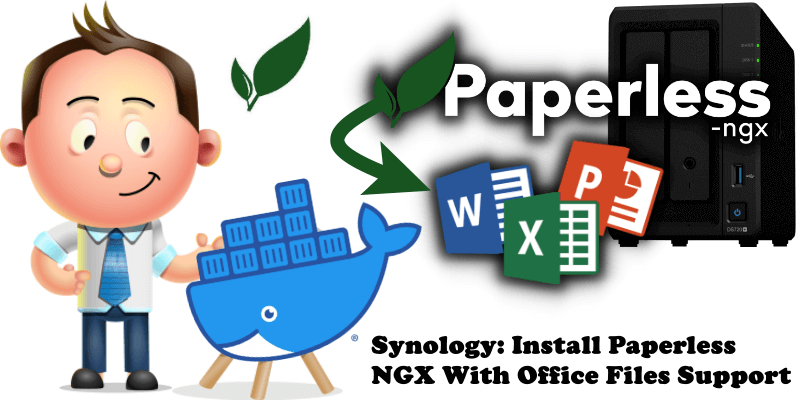
Paperless-ngx is a document management system that transforms your physical documents into a searchable online archive so you can keep, well, less paper. After my article on How to Install Paperless NGX on Your Synology NAS, many people have contacted me asking for an even more comprehensive guide so that office files such as .docx could also be uploaded. In this step by step guide I will show you how to install Paperless-ngx with Office files support on your Synology NAS using Docker & Portainer.
STEP 1
Please Support My work by Making a Donation.
STEP 2
Install Portainer using my step by step guide. If you already have Portainer installed on your Synology NAS, skip this STEP. Attention: Make sure you have installed the latest Portainer version.
STEP 3
Make sure you have a synology.me Wildcard Certificate. Follow my guide to get a Wildcard Certificate. If you already have a synology.me Wildcard certificate, skip this STEP.
STEP 4
Go to Control Panel / Login Portal / Advanced Tab / click Reverse Proxy. Follow the instructions in the image below.
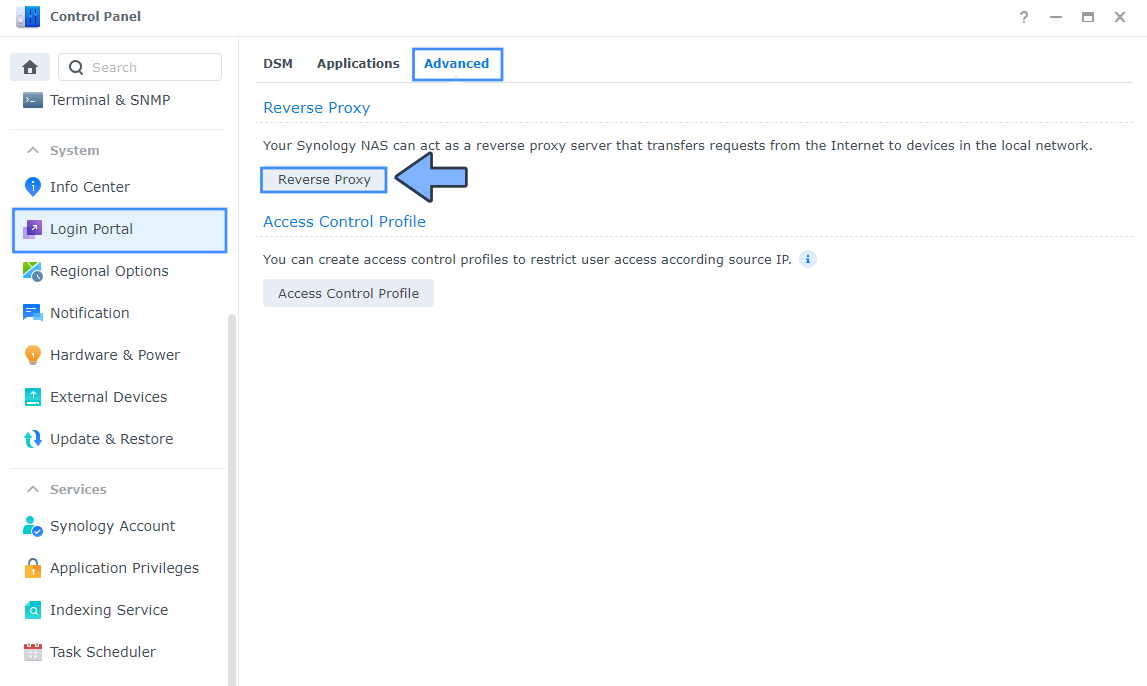
STEP 5
Now click the “Create” button. Follow the instructions in the image below.
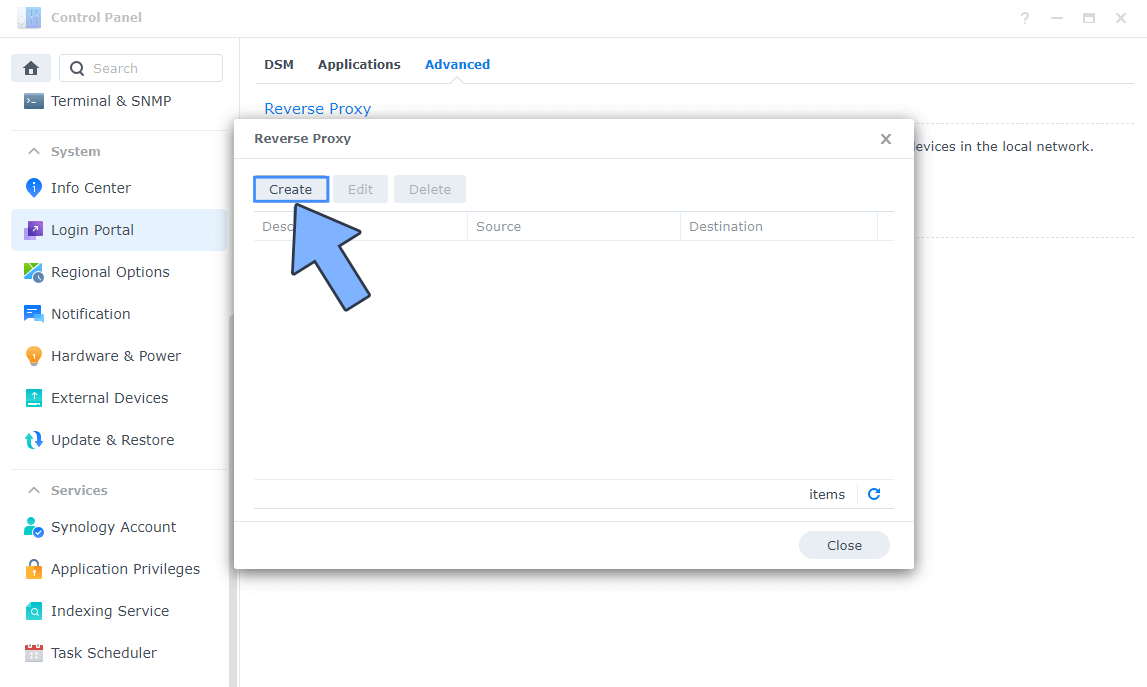
STEP 6
After you click the Create button, the window below will open. Follow the instructions in the image below.
On the General area, set the Reverse Proxy Name description: type in Paperless-NGX. After that, add the following instructions:
Source:
Protocol: HTTPS
Hostname: paperlessngx.yourname.synology.me
Port: 443
Check Enable HSTS
Destination:
Protocol: HTTP
Hostname: localhost
Port: 8777
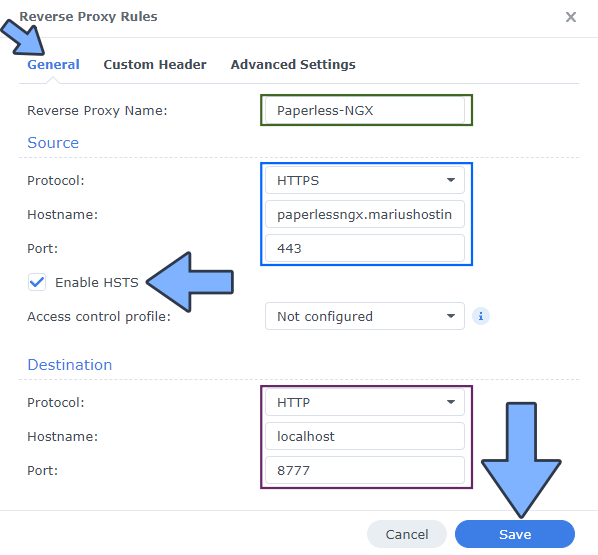
STEP 7
On the Reverse Proxy Rules click the Custom Header tab. Click Create and then, from the drop-down menu, click WebSocket. After you click on WebSocket, two Header Names and two Values will be automatically added. Click Save. Follow the instructions in the image below.

STEP 8
Go to Control Panel / Network / Connectivity tab/ Check Enable HTTP/2 then click Apply. Follow the instructions in the image below.
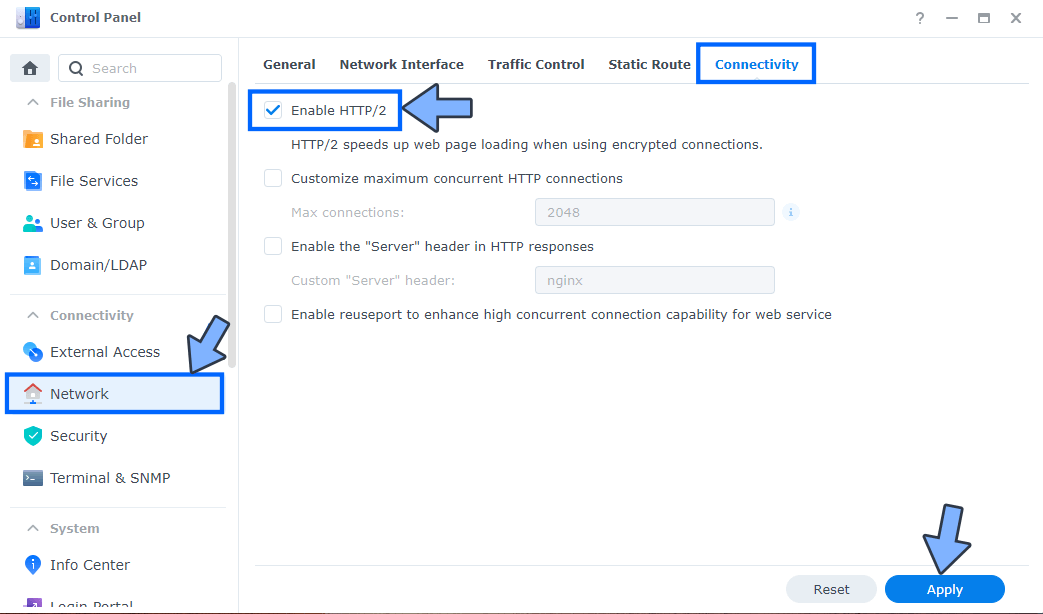
STEP 9
Go to Control Panel / Security / Advanced tab/ Check Enable HTTP Compression then click Apply. Follow the instructions in the image below.
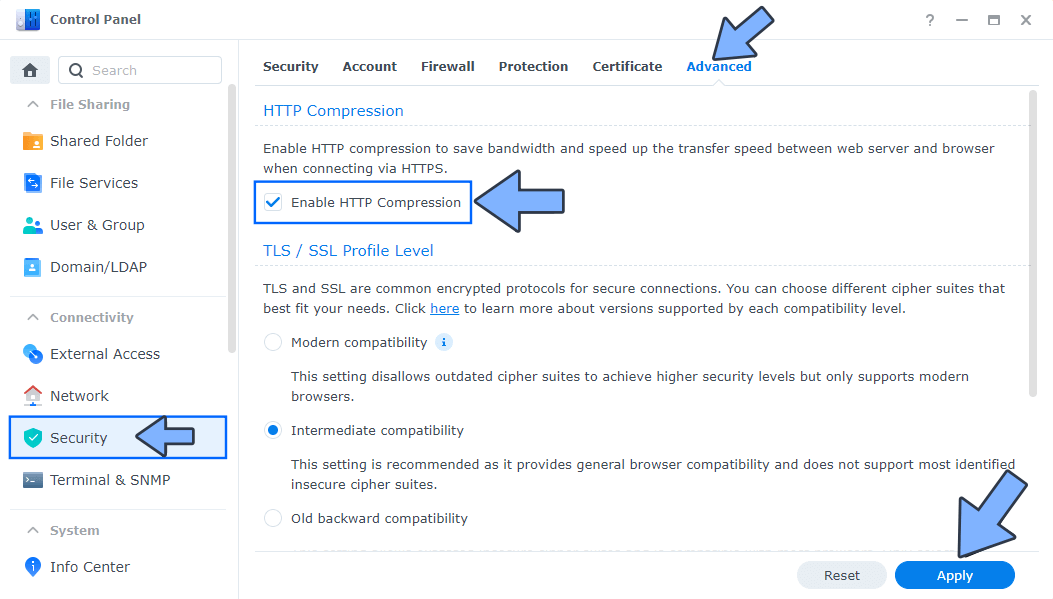
STEP 10
Go to File Station and open the docker folder. Inside the docker folder, create one new folder and name it paperlessngx. Follow the instructions in the image below.
Note: Be careful to enter only lowercase, not uppercase letters.
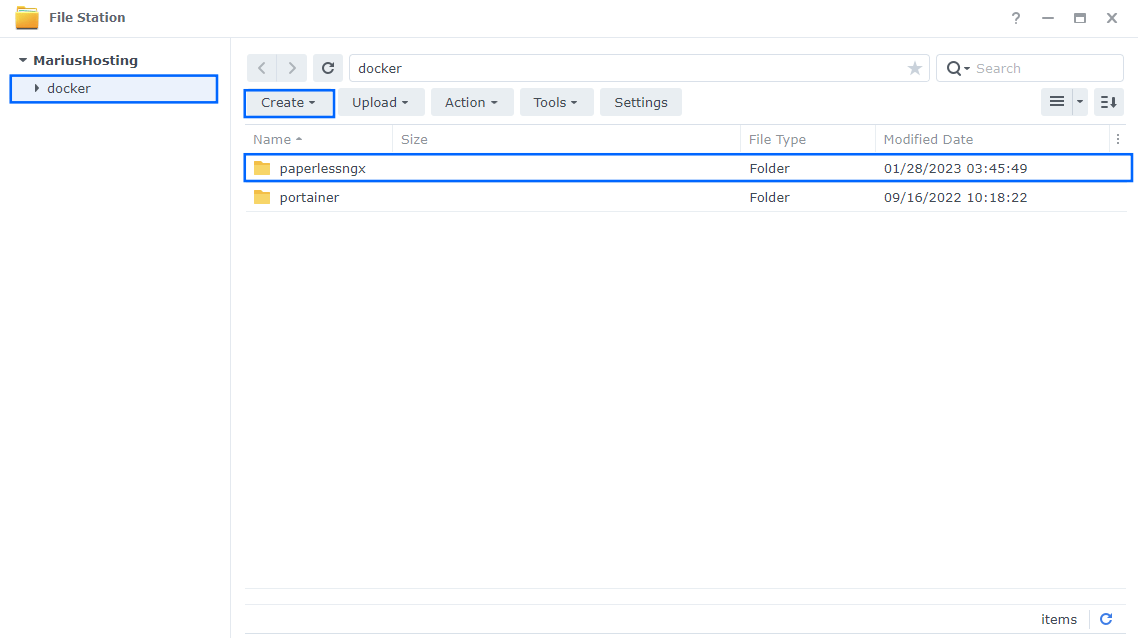
STEP 11
Now create seven new folders inside the paperlessngx folder that you created at STEP 10 and name them consume, data, db, export, media, redis, trash. Follow the instructions in the image below.
Note: Be careful to enter only lowercase, not uppercase letters.
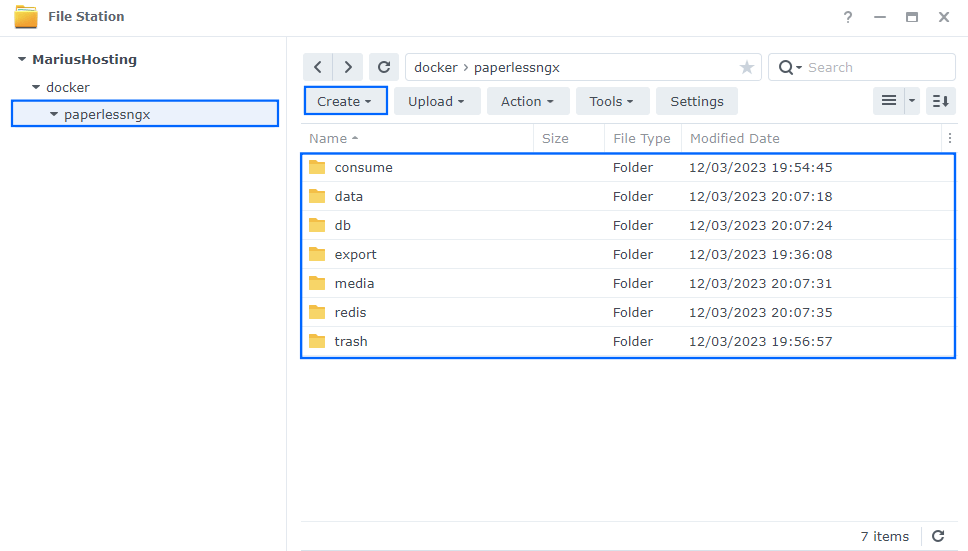
STEP 12
Log into Portainer using your username and password. On the left sidebar in Portainer, click on Home then Live connect. Follow the instructions in the image below.

On the left sidebar in Portainer, click on Stacks then + Add stack. Follow the instructions in the image below.

STEP 13
In the Name field type in paperlessngx. Follow the instructions in the image below.
services:
redis:
image: redis:8
command:
- /bin/sh
- -c
- redis-server --requirepass redispass
container_name: PaperlessNGX-REDIS
hostname: paper-redis
security_opt:
- no-new-privileges:true
read_only: true
user: 1026:100
healthcheck:
test: ["CMD-SHELL", "redis-cli ping || exit 1"]
volumes:
- /volume1/docker/paperlessngx/redis:/data:rw
environment:
TZ: Europe/Bucharest
restart: on-failure:5
db:
image: postgres:18
container_name: PaperlessNGX-DB
hostname: paper-db
security_opt:
- no-new-privileges:true
healthcheck:
test: ["CMD", "pg_isready", "-q", "-d", "paperless", "-U", "paperlessuser"]
timeout: 45s
interval: 10s
retries: 10
volumes:
- /volume1/docker/paperlessngx/db:/var/lib/postgresql:rw
environment:
POSTGRES_DB: paperless
POSTGRES_USER: paperlessuser
POSTGRES_PASSWORD: paperlesspass
restart: on-failure:5
gotenberg:
image: gotenberg/gotenberg:latest
container_name: PaperlessNGX-GOTENBERG
hostname: gotenberg
security_opt:
- no-new-privileges:true
user: 1026:100
command:
- "gotenberg"
- "--chromium-disable-javascript=true"
- "--chromium-allow-list=file:///tmp/.*"
restart: on-failure:5
tika:
image: docker.io/apache/tika:latest
container_name: PaperlessNGX-TIKA
hostname: tika
security_opt:
- no-new-privileges:true
user: 1026:100
restart: on-failure:5
paperless:
image: ghcr.io/paperless-ngx/paperless-ngx:latest
container_name: PaperlessNGX
hostname: paperless-ngx
security_opt:
- no-new-privileges:true
healthcheck:
test: ["CMD", "curl", "-fs", "-S", "--max-time", "2", "http://localhost:8000"]
interval: 30s
timeout: 10s
retries: 5
ports:
- 8777:8000
volumes:
- /volume1/docker/paperlessngx/data:/usr/src/paperless/data:rw
- /volume1/docker/paperlessngx/media:/usr/src/paperless/media:rw
- /volume1/docker/paperlessngx/export:/usr/src/paperless/export:rw
- /volume1/docker/paperlessngx/consume:/usr/src/paperless/consume:rw
- /volume1/docker/paperlessngx/trash:/usr/src/paperless/trash:rw
environment:
PAPERLESS_REDIS: redis://:redispass@paper-redis:6379
PAPERLESS_DBENGINE: postgresql
PAPERLESS_DBHOST: paper-db
PAPERLESS_DBNAME: paperless
PAPERLESS_DBUSER: paperlessuser
PAPERLESS_DBPASS: paperlesspass
PAPERLESS_EMPTY_TRASH_DIR: ../trash
PAPERLESS_FILENAME_FORMAT: '{{ created_year }}/{{ correspondent }}/{{ document_type }}/{{ title }}'
PAPERLESS_OCR_ROTATE_PAGES_THRESHOLD: 6
PAPERLESS_TASK_WORKERS: 1
USERMAP_UID: 1026
USERMAP_GID: 100
PAPERLESS_SECRET_KEY: dOxZYTTZgXKMHkqLBIQVImayQXAVWdzGBPuFJKggzcgvgPJPXpWzqzKaUOIOGGIr
PAPERLESS_TIME_ZONE: Europe/Bucharest
PAPERLESS_ADMIN_USER: marius
PAPERLESS_ADMIN_PASSWORD: mariushosting
PAPERLESS_URL: https://paperlessngx.yourname.synology.me
PAPERLESS_CSRF_TRUSTED_ORIGINS: https://paperlessngx.yourname.synology.me
PAPERLESS_OCR_LANGUAGE: deu+eng
PAPERLESS_TIKA_ENABLED: 1
PAPERLESS_TIKA_GOTENBERG_ENDPOINT: http://gotenberg:3000
PAPERLESS_TIKA_ENDPOINT: http://tika:9998
restart: on-failure:5
depends_on:
db:
condition: service_healthy
redis:
condition: service_healthy
tika:
condition: service_started
gotenberg:
condition: service_started
Note: Before you paste the code above in the Web editor area below, change the value numbers for user with your own UID and GID values. (Follow my step by step guide on how to do this.) 1026 is my personal UID value and 100 is my personal GID value. You have to type in your own values.
Note: Before you paste the code above in the Web editor area, change the value for TZ with your own time zone value. (Select your current Time Zone from this list.)
Note: Before you paste the code above in the Web editor area, change the values for USERMAP_UID and USERMAP_GID with your own number values. (Follow my step by step guide on how to do this.)
Note: Before you paste the code above in the Web editor area below, change the value for PAPERLESS_SECRET_KEY. (Generate your own Random 64 length PAPERLESS_SECRET_KEY.)
Note: Before you paste the code above in the Web editor area, change the value for PAPERLESS_TIME_ZONE with your own time zone value. (Select your current Time Zone from this list.)
Note: Before you paste the code above in the Web editor area, change the value for PAPERLESS_ADMIN_USER and add your own username. marius is an example of a username. You have to insert your own username.
Note: Before you paste the code above in the Web editor area, change the value for PAPERLESS_ADMIN_PASSWORD and add your own password. mariushosting is an example of a password. You have to insert your own password.
Note: Before you paste the code above in the Web editor area below, change the value for PAPERLESS_URL and type in your own synology.me DDNS with https:// at the beginning that you have previously created at STEP 6.
Note: Before you paste the code above in the Web editor area below, change the value for PAPERLESS_CSRF_TRUSTED_ORIGINS and type in your own synology.me DDNS with https:// at the beginning that you have previously created at STEP 6.
Note: Before you paste the code above in the Web editor area below, change the value for PAPERLESS_OCR_LANGUAGE and type in your own OCR language. deu+eng is for German and English. nld+eng is for Dutch and English. It’s important to understand that you need to add your own language firs AND then +eng for English. +eng is always mandatory. If you only add your OCR language, like deu, but not +eng, then paperless won’t work.
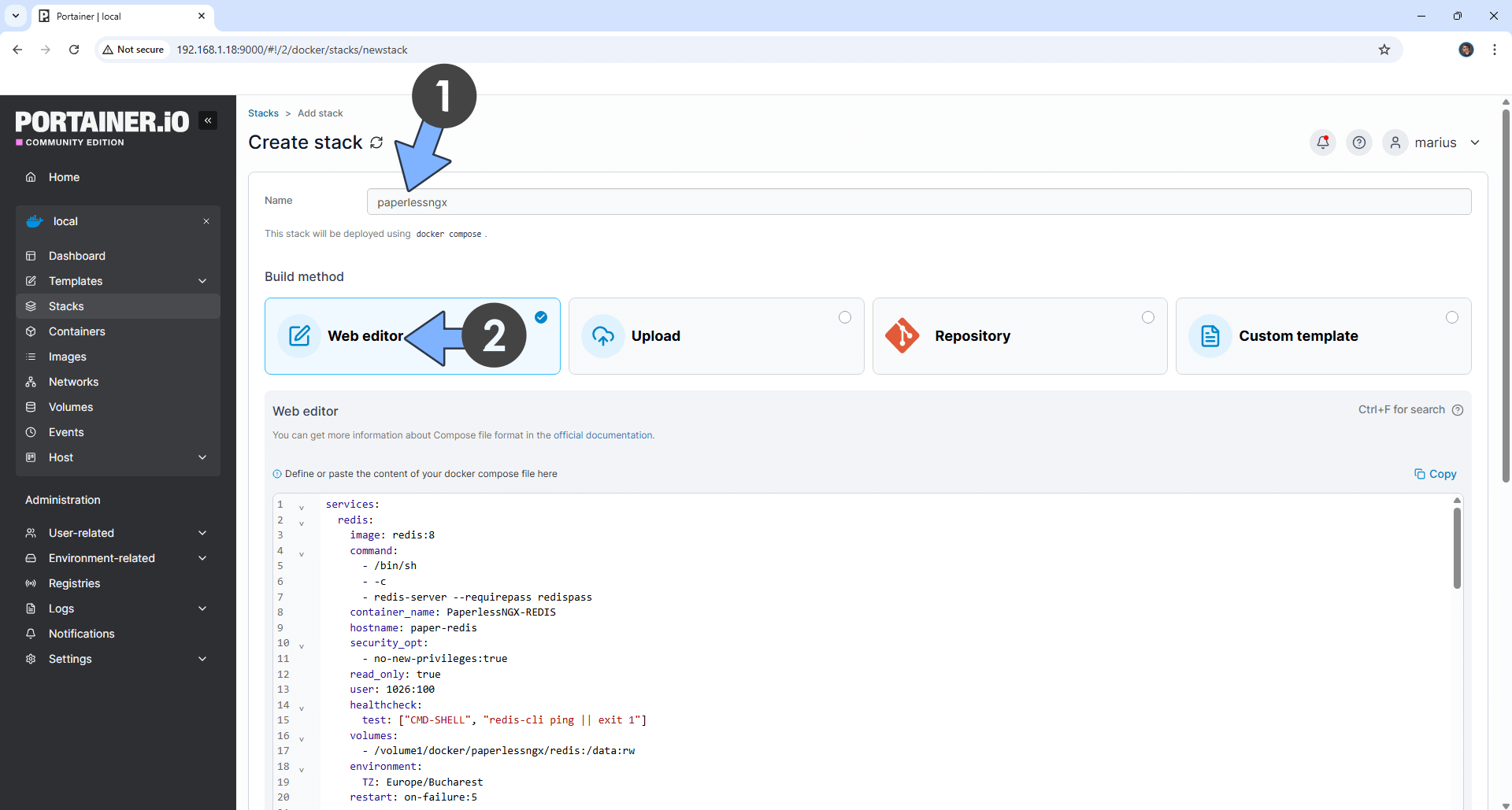
STEP 14
Scroll down on the page until you see a button named Deploy the stack. Click on it. Follow the instructions in the image below. The installation process can take up to a few minutes. It will depend on your Internet speed connection.
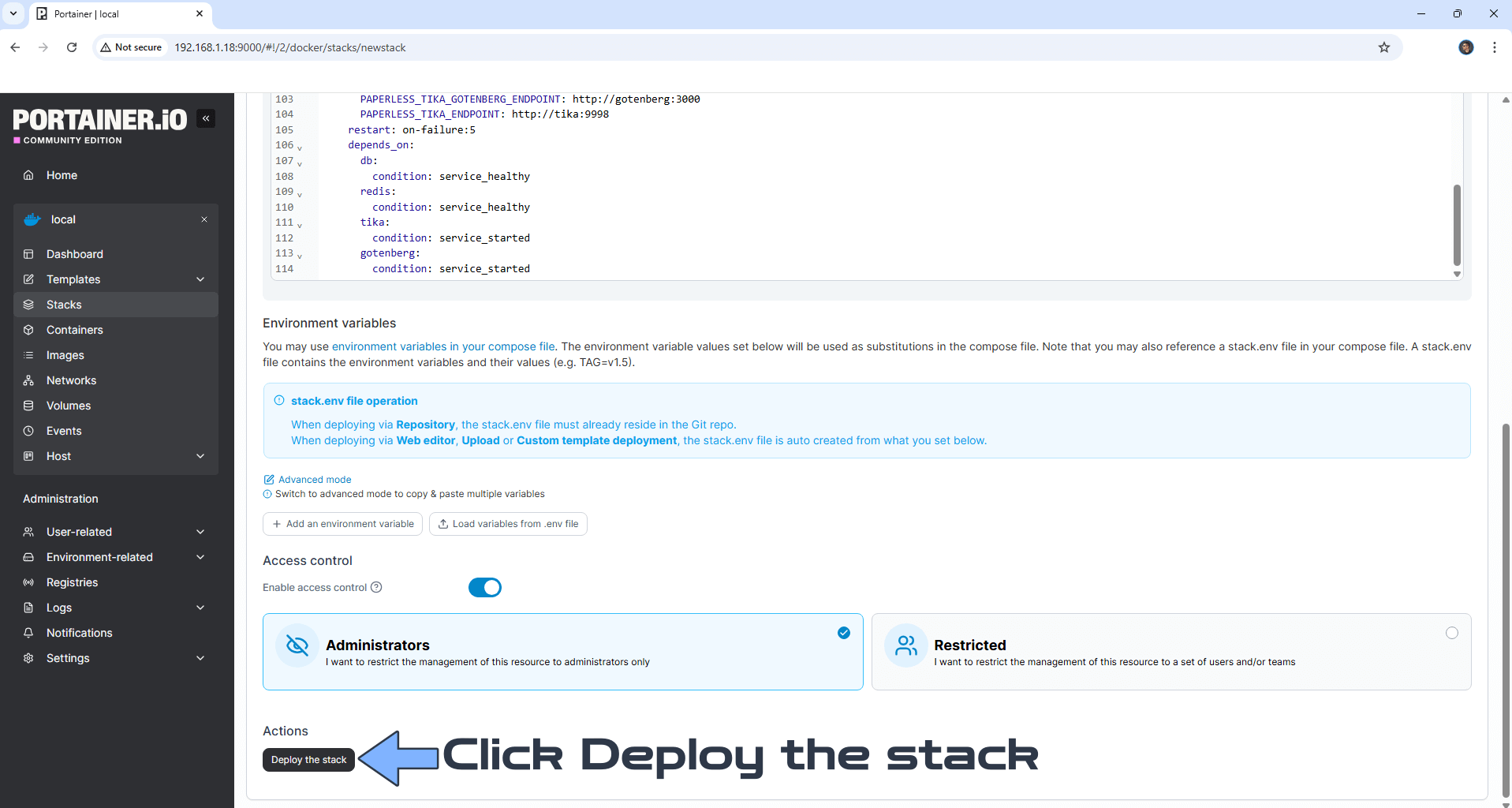
STEP 15
If everything goes right, you will see the following message at the top right of your screen: “Success Stack successfully deployed“.

STEP 16
🟢Please Support My work by Making a Donation. Almost 99,9% of the people that install something using my guides forget to support my work, or just ignore STEP 1. I’ve been very honest about this aspect of my work since the beginning: I don’t run any ADS, I don’t require subscriptions, paid or otherwise, I don’t collect IPs, emails, and I don’t have any referral links from Amazon or other merchants. I also don’t have any POP-UPs or COOKIES. I have repeatedly been told over the years how much I have contributed to the community. It’s something I love doing and have been honest about my passion since the beginning. But I also Need The Community to Support me Back to be able to continue doing this work.
STEP 17
Now open your browser and type in your HTTPS/SSL certificate like this https://paperlessngx.yourname.synology.me that you have previously created at STEP 6. In my case it’s https://paperlessngx.mariushosting.synology.me If everything goes right, you will see the Paperless-NGX Login page. Type in your own admin Username and Password that you have previously created at STEP 13 then click Sign in. Follow the instructions in the image below. ⚠️Warning: if you get an error message that says Username and/or password incorrect, this means your NAS is slow and didn’t create the superadmin user. You need to wait 2-3 minutes longer and try to log in again. Don’t rush to change the password or reinstall everything from scratch, just wait.
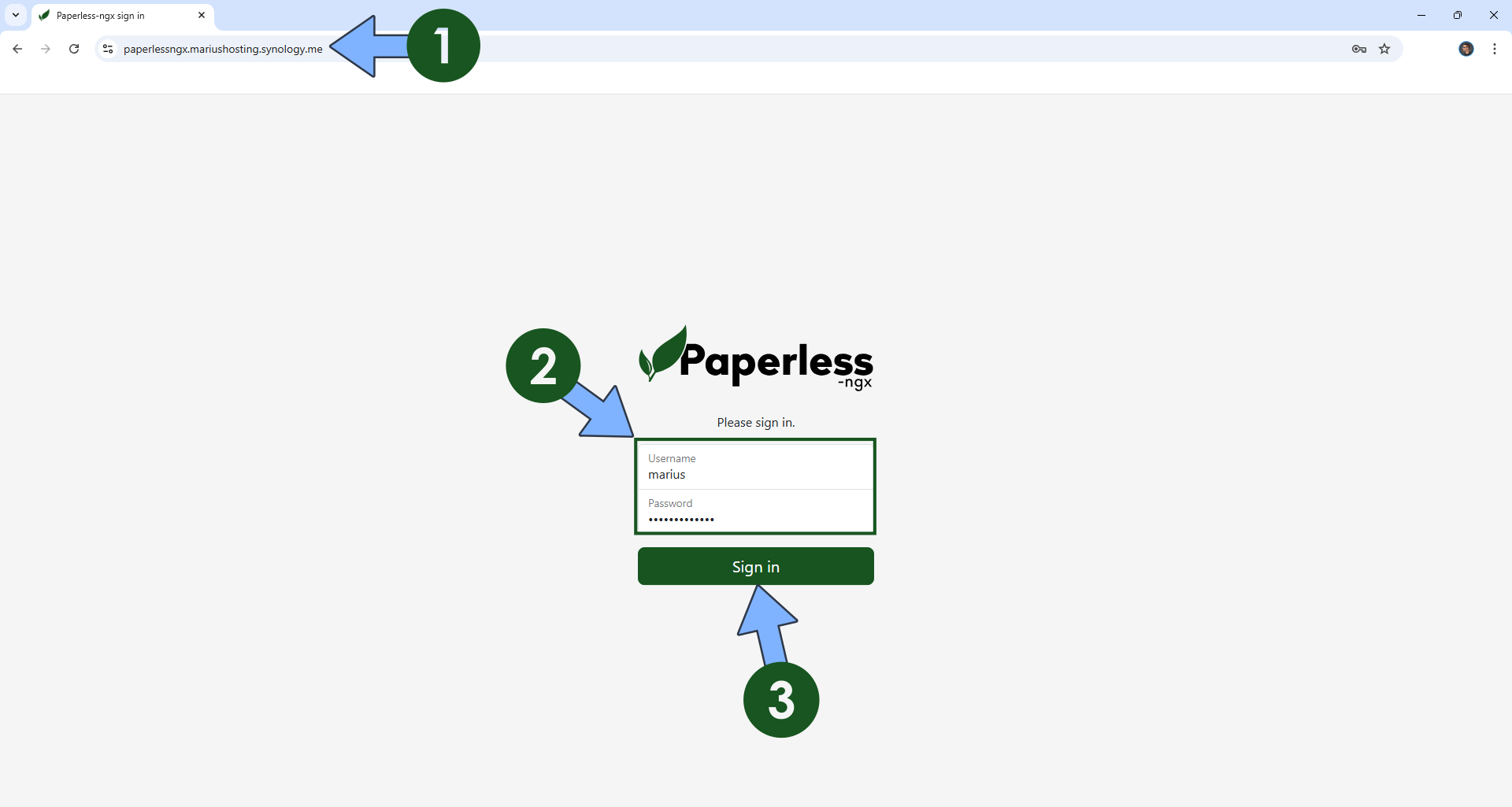
STEP 18
Start uploading your documents now with Office files support!
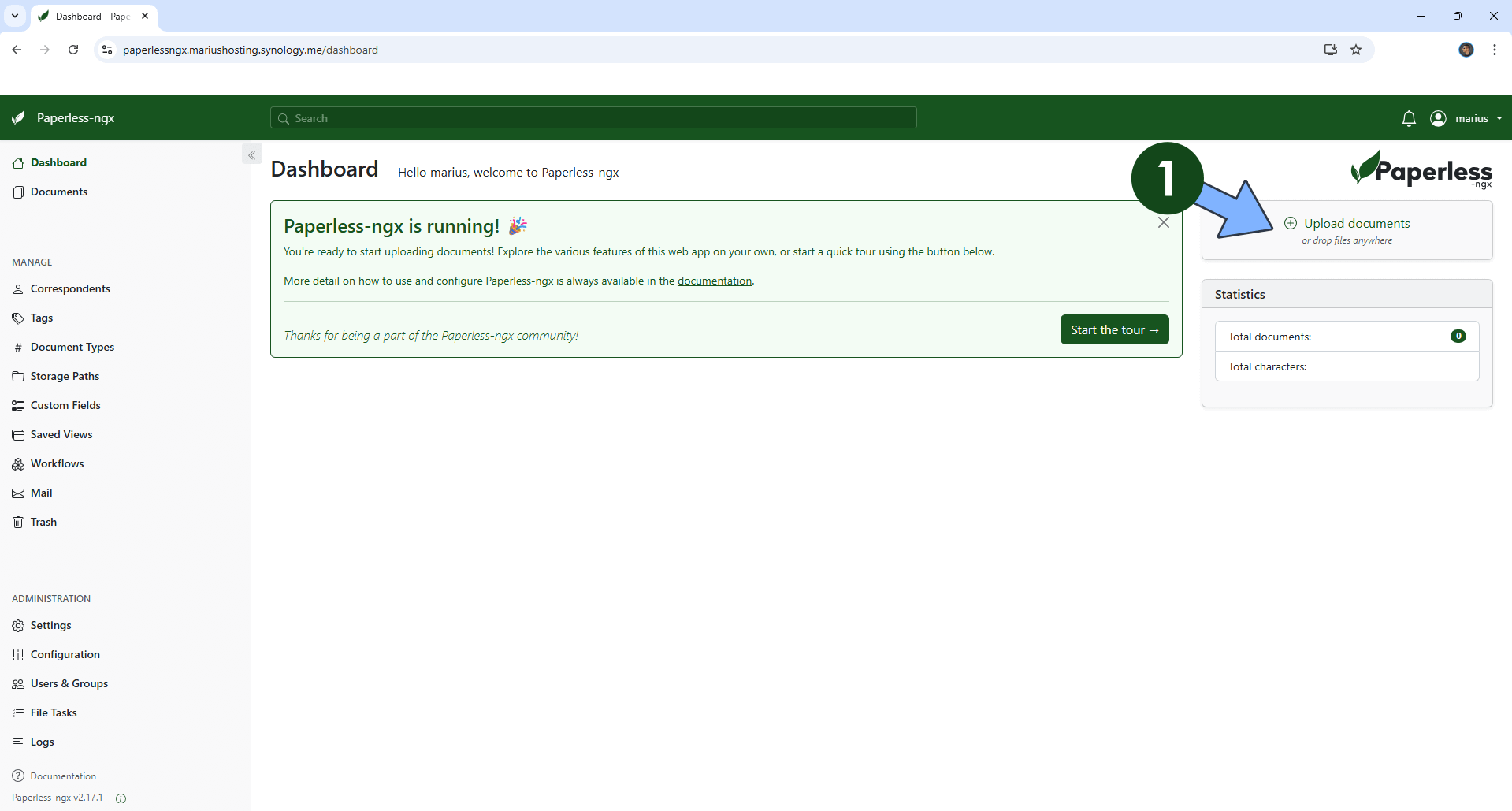
STEP 19
Click Documents. Follow the instructions in the image below.
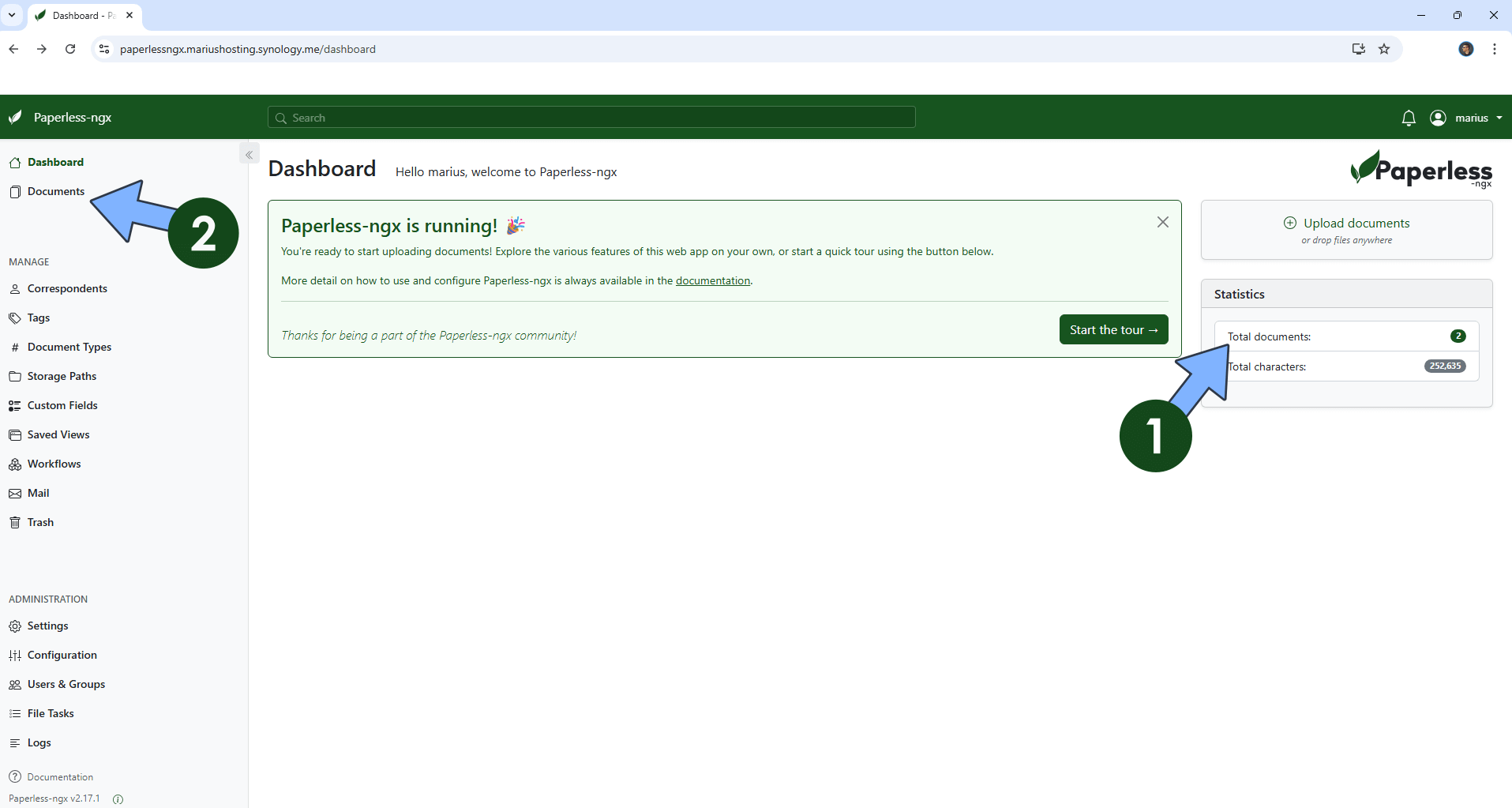
Enjoy Paperless-ngx with Office files support!
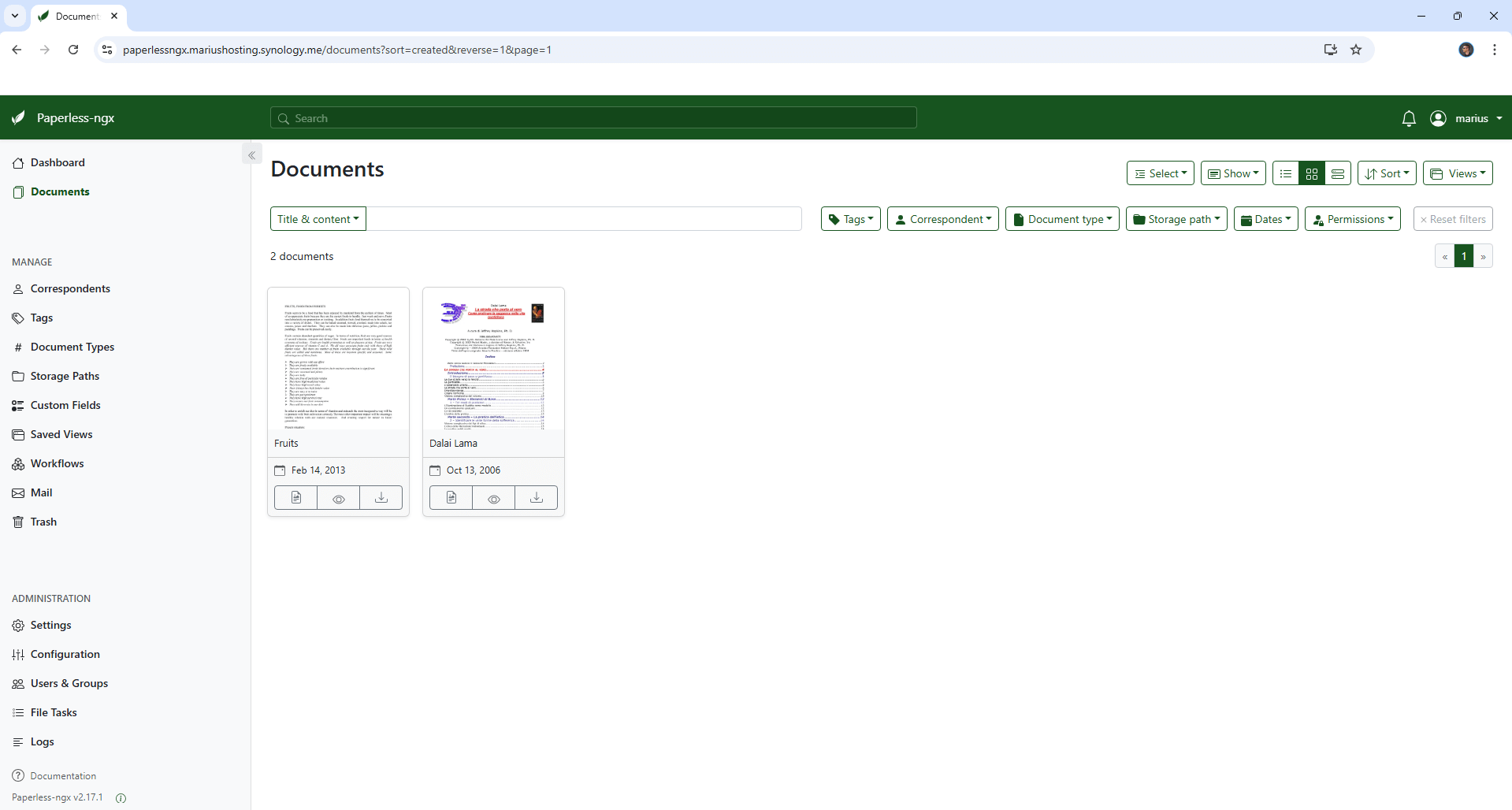
You can also enable Dark Mode and change the Sidebar Color Theme. On the left sidebar, click on Settings – General tab, then follow the instructions below.
Uncheck Use system settings
Check Enable dark mode.
Uncheck Invert thumbnails in dark mode.
Change your Theme Color then click Save. Follow the instructions in the image below.
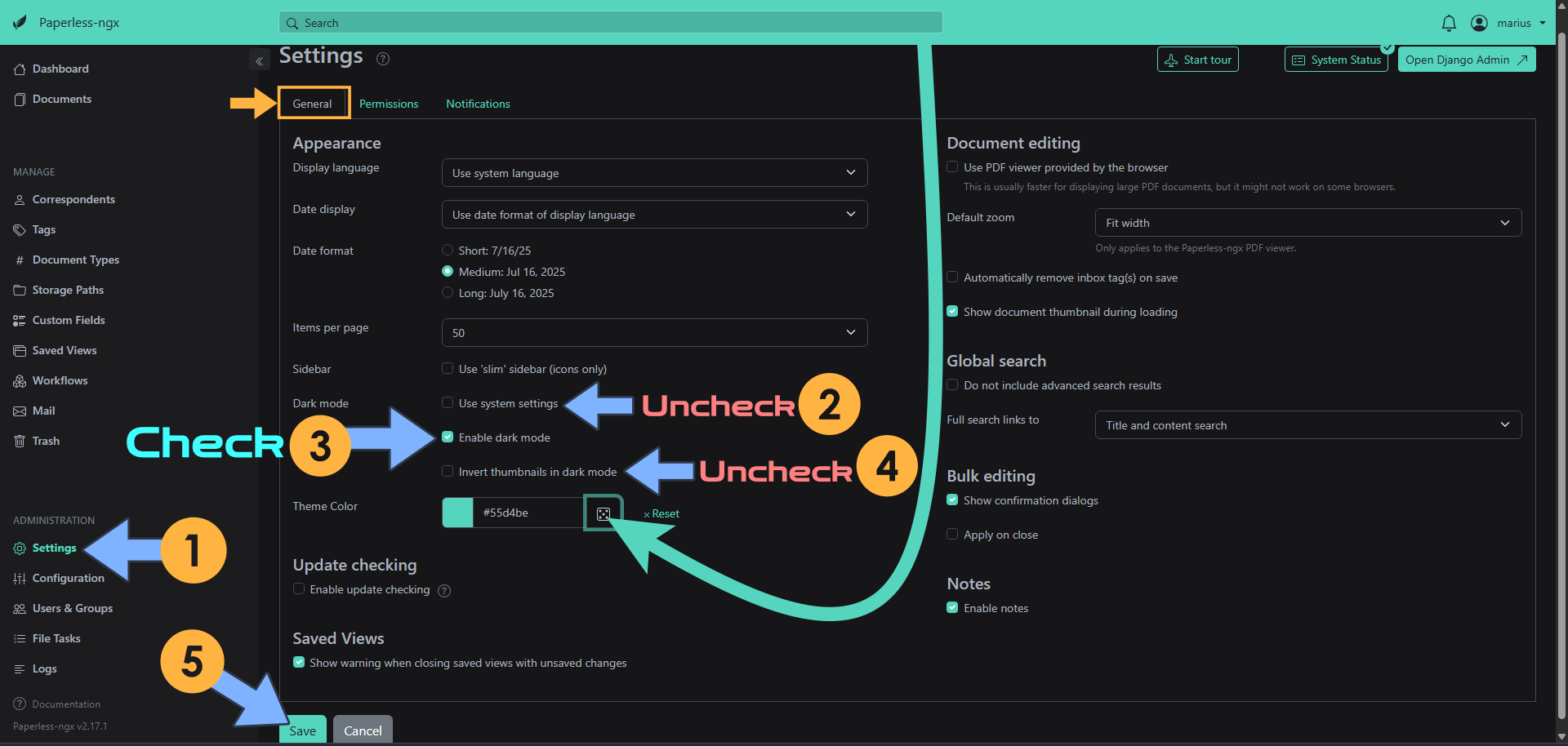
If you encounter issues by using this container, make sure to check out the Common Docker issues article.
🔥Troubleshoot: If you use the MDY (Month-Day-Year) format instead of the DMY (Day-Month-Year) format, add the following line to your compose file at STEP 13:
PAPERLESS_DATE_ORDER: MDY
just after
PAPERLESS_TIME_ZONE: Europe/Bucharest🔥Troubleshoot: If you get the “Error while converting document to PDF: 503 Server Error: Service Unavailable for url: http://gotenberg:3000/forms/libreoffice/convert” – This is usually due to the server being “down” for scheduled maintenance or due to a heavy traffic load that prevents it from properly serving all incoming requests. You need to wait until the server is back up again. Also, the issue can be related to the fact that you are trying to access PaperlessNGX locally instead of via Reverse Proxy. Websocket at STEP 7 is mandatory.
🔥Troubleshoot: In case you get the following error message: Error occurred while consuming document invoice.pdf: DigitalSignatureError: Input PDF has a digital signature. OCR would alter the document, invalidating the signature, just add the following Environment variable in the compose at STEP 13:
PAPERLESS_OCR_USER_ARGS: '{"invalidate_digital_signatures": true}'
Add it after:
PAPERLESS_CSRF_TRUSTED_ORIGINS: https://paperlessngx.yourname.synology.me
It should look like this:
PAPERLESS_CSRF_TRUSTED_ORIGINS: https://paperlessngx.yourname.synology.me
PAPERLESS_OCR_USER_ARGS: '{"invalidate_digital_signatures": true}'
🔥Troubleshoot: If you want to add an OCR language that is not installed by default on Paperless-NGX, you just need to add the following Environment variables (BOTH) in the compose at STEP 13:
PAPERLESS_OCR_LANGUAGES: nld nor #Install the language packages, for example nld and nor for Dutch and Norway, or just nld for Dutch or nor for Norway or a combination of both. PAPERLESS_OCR_LANGUAGE: eng #Set default language to English. This is mandatory. Without this environment variable, the other languages like nld or nor will not be installed.
⚠️Warning: If you need to re-create the PaperlessNGX superuser again, just open the container bash shell and type in:
python manage.py createsuperuser
💡Suggestion: You can also install Stirling-PDF to better manage your documents.
💡Suggestion: You can also install Documenso that provides secure and efficient digital document signing and processing.
💡Suggestion: You can also install DocuSeal that provides secure and efficient digital document signing and processing.
💡Suggestion: You can also install Paperless-AI that provides automated document analysis with AI.
💡Suggestion: You can also install Papra to manage your documents.
Note: Can I run Docker on my Synology NAS? See the supported models.
Note: How to Back Up Docker Containers on your Synology NAS.
Note: Find out how to update the Paperless-ngx container with the latest image.
Note: How to Free Disk Space on Your NAS if You Run Docker.
Note: How to Schedule Start & Stop For Docker Containers.
Note: How to Activate Email Notifications.
Note: How to Add Access Control Profile on Your NAS.
Note: How to Change Docker Containers Restart Policy.
Note: How to Use Docker Containers With VPN.
Note: Convert Docker Run Into Docker Compose.
Note: How to Clean Docker.
Note: How to Clean Docker Automatically.
Note: Best Practices When Using Docker and DDNS.
Note: Some Docker Containers Need WebSocket.
Note: Find out the Best NAS Models For Docker.
Note: Activate Gmail SMTP For Docker Containers.
This post was updated on Tuesday / February 17th, 2026 at 12:40 AM
